The 4-1-1 House: Bridging the opportunity gap
Photos by Julie Nabours and contributed by Magnolia and Kim White
Jeff and Kim White are working to fulfill a mission: Provide hope and support for young people who need it.

Hard work, community support and a grant from “Fixer Upper” stars Chip and Joanna Gaines are helping them reach their goal.
The Whites wanted to create a place where underserved youth of East Temple can go after school to be with other boys and adult mentors to learn life skills. Their plan was to buy a fixer-upper house and renovate it to fit the needs of the community.
“We want to provide relationship-based programs and experiences to empower the marginalized youth with opportunities to visualize, realize and reach their full potential,” said Kim.
In September the Whites bought a house at 411 S. 32nd St. in Temple. The home came with its own historical significance. It once belonged to Temple civil rights activist Myrtle Captain.
But they needed money for the renovation. Kim learned about the ChipStarter Contest sponsored by Chip and Joanna Gaines four days before the entry deadline. Winners would receive a monetary gift to fund their dream.
To be considered, the Whites needed to create a video about their project, fill out an application, send it in and hope.
“I made a video on my phone that Sunday, filled out the form Tuesday and submitted it at 9:52 a.m.,” she said. It was a mere eight minutes before the deadline.

The Whites were chosen as one of six winners. They were summoned to Waco for the big reveal. They were awarded the largest prize: $40,000 to begin their vision. The Whites created a foundation called Bridge East Temple. What happened next was equally extraordinary. They received pledges for materials and in-kind donations to rebuild the rooms, including drywall, hardware, appliances, flooring and labor. A roofing company donated its services. So far, the $40,000 grant is untouched; it will be used for future expenses.
“Having a foundation allows us to broaden our funding base and the ability to allow more people to become aware and involved,” said Jeff White, who is a member of American MENSA and has a degree from the Mays Business School at Texas A&M University – College Station.
“People can give money if they want to do it. They understand the need,” Jeff said.
The interior demolition began in December. Volunteers of all ages and ethnic backgrounds came to dismantle walls and remove floor boards. Tons of material from the old house was discarded, leaving only a shell. In the process, the
Whites found memorabilia left by Miss Captain, including tapes of her most prolific speeches.
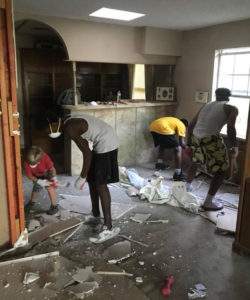
The 4-1-1
In addition to learning life skills, the youth will have access to James Wilson Park located nearby. They will be able to enjoy water parks, football games and other activities.
“When kids don’t have those opportunities, they are not learning, not growing, not gaining social skills to handle life,” said Kim, who has a BA in psychology from Texas A&M and an MA in Biblical counseling from the Dallas Theological Seminary. “They can’t dream, hope. People say you can do this, but if you can’t see it, you can’t get there. Experience is very big. You learn by experience, and mentors.”
Jeff said there is a lack of male role models for the boys of East Temple and The 4-1-1 House will fill that void.
Marcus Wimby, a graduate of the University of Mary Hardin-Baylor with a BA in business administration, and Dion Alexander II, who is pursuing a degree in psychology, will reside in the home.
Both men are from New Orleans and were displaced, along with their families, after Hurricane Katrina in 2005. Wimby went to Dallas and then to UMHB, where he played football. Alexander’s family went to Missouri, where they lived on a 56-acre farm for several months. The young man from the inner city learned how to run a tractor, herd cattle and do farm chores.
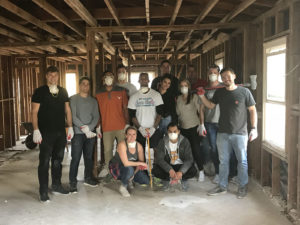
“They (the farm family that hosted the Alexanders) helped us get on our feet until we could get our own place,” Alexander said. “It completely recreated my perspective.”
“Our backgrounds help us understand that things could be better. We didn’t grow up with the best living or financial situations,” said Wimby.
“We are fighting the same battles that they are fighting,” added Alexander.
The Whites became involved with East Temple youth more than a year ago when they started spending time with the kids at Wayman Manor. “Needs kept coming up. We talked to friends to see if anyone would like to help us with this need,” said Kim. “Most of the needs were educational. So many kids were behind in their class. Some kids couldn’t read and if they didn’t get up in time for school and missed their bus, they had no way to get to school.”
Volunteers helped get the youngsters to school. The White’s church donated pizza and sodas once a week. Friendships were formed. Needs were met. But when families started to move away, the program concluded.
With summer 2017 coming to an end, the Whites decided to create a safe place with adult supervision where boys could go to learn life skills, eat a meal, get help with their homework and encouragement for their dreams.
“It was more about building relationships with kids to raise awareness of gaps and disconnects in the community, and help meet some of those needs and bridge the gaps,” said Kim.
When Wimby and Alexander were asked to be a part of The 4-1-1 as the adult residents, they didn’t hesitate.
“Before I met Kim, I was working at Lamar Middle School. I had been here four years and had no idea that Temple looked like this,” said Wimby. “I had no idea these that these kids existed. At UMHB everything is new. Then I stepped into this world and found myself loving these kids.”
“Once you find something that has a positive focus, everything is going to fall in line with that positivity,” said Alexander. “If I can help in a positive way, why not? This is what God wants me to do instead of doing what I wanted to do.”

“If one kid came back to me and said you helped me get my life together, this is living a good life,” said Wimby. “My dream, once we open, is to groom the first generation of guys. Once they get to where we are now, they will want to do the same for kids in this community. They will be living testimonies to Temple.”
“They can break the cycle,” Said Alexander. “I want to give the boys the same opportunity given to me, give them the perspective, that drive.”
Wimby was convinced that being involved is the right thing to do when he found out Miss Captain once lived in the house. “We are living in an activist’s house,” he said. “Sometimes I feel this is what she prayed for, to use her house in a positive way, definitely supposed to be happening. All the historic memorabilia, the awards, stuff to see that this lady was somebody. The fact that we will live in this house is an honor.”
Some things Miss Captain left transcend generations.
“She was a civil rights activist. Positively this has been handed down by God’s hand. Any obstacle we could have has already been cleared by Him, 10 miles before we got here,” Alexander said. “We will help to continue what she fought for during those times in Temple. It’s a sign of approval that what we are doing was meant to be happening.”
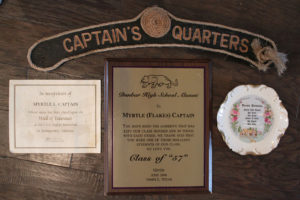
Myrtle L. Captain: Civil rights trailblazer
When Jeff and Kim White of Bridge East Temple first entered The 4-1-1 House in East Temple a sign over the door read “Captain’s Quarters.” It indicated that the woman who lived in the house knew who she was and wasn’t afraid to speak her mind.
Myrtle Louise Captain was born Nov. 26, 1939, and died Sept. 22, 2010. She is remembered for her civil rights activism in Temple.
As a young woman in 1959, she took a job working the temporary night shift at the Fort Hood post laundry. But that wasn’t enough for Miss Captain. The country was in the throes of the Civil Rights Movement and she wanted to achieve more.
In the late 1960s, Miss Captain had a friendly talk with one of the post laundry personnel managers. She expressed her desire to move up the ladder; she was even traveling to Houston to take keypunch classes. Her persistence paid off and she was appointed the Equal Employment Opportunity Officer on post, a job she held until her retirement in 1995.
Miss Captain always wanted to walk with Martin Luther King but never had that opportunity. Still, she worked to make things better.
“Temple was my home and I saw things in my home that needed to be corrected,” she said in an article dated Jan. 21, 2008, by Temple Daily Telegram reporter Harper Scott Clark.
Miss Captain was the president of the local NAACP chapter for 13 years, fought for single member districts for the Temple city commission and Temple school board so that “blacks would have fair representation.”
According Clark’s article, “Temple voters approved a charter change by a 6 to 1 margin for the election of commissioners from single-member districts. The vote was 916 in favor of the charter change and 159 against it.”
Temple ISD was under court order in 1970 to integrate its schools. Miss Captain was there in 1972 when U.S. District Court Judge Jack Roberts in Austin told Temple officials they “should go home and figure this thing out . . . meaning if Temple didn’t do something equitable for the minority people it would go to the highest court,” she said.
Temple ISD was ordered to form seven independent trustee districts in 1978.
Myrtle Captain also authored three books and was the mother of two. She is honored by her hometown with a street that bears her name. The street running along side of The 4-1-1 house is aptly named Myrtle Captain Street.

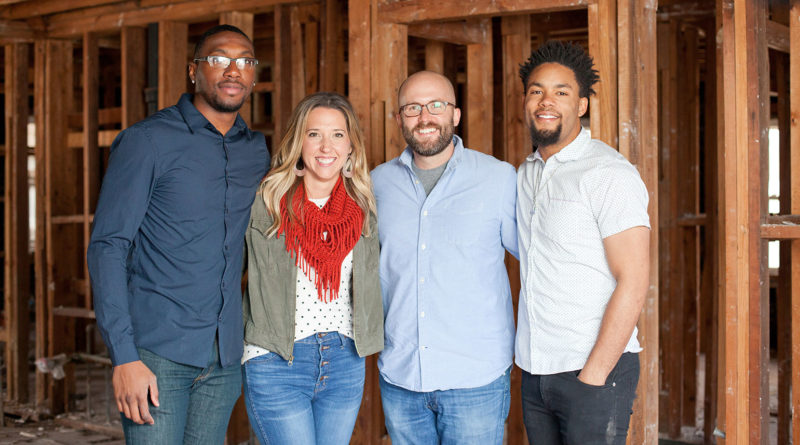

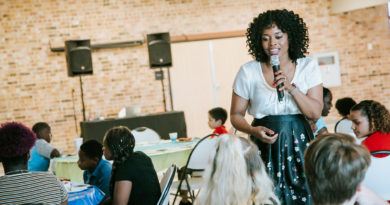

Thank you for this article. Mrs. Captain would (is) be proud. Without you knowing Mrs. Captain had 3 children. Thank you again,
Charmin LaTrell Flakes-Truesdale